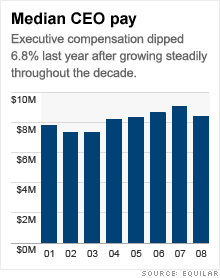Pay czar readies for bonus season
Kenneth Feinberg is set to trim bonuses right before the checks are set to go out, raising concerns that top talent at seven companies will up and leave.

NEW YORK (CNNMoney.com) -- It's bonus time on Wall Street and pay czar Kenneth Feinberg is walking a thin line.
Feinberg, Treasury's special master for executive compensation, has a mandate to determine appropriate executive pay packages for the top employees at the seven most heavily bailed out companies: AIG (AIG, Fortune 500), Citigroup (C, Fortune 500), Bank of America (BAC, Fortune 500), General Motors, Chrysler, Chrysler Financial and GMAC.
After reviewing those firms' pay packages for their top 25 executives last month, Feinberg has begun to review compensation plans for the next 75 highest-paid employees at each company. That report is due out by the end of the year, and Feinberg recently said he hopes to issue his ruling by the beginning of December -- just before bonuses get doled out.
In October, the pay czar cut total compensation for the top 25 executives at the seven firms by about half, scaling back salaries by 90% and transferring payments into performance-based, longer-term stock options. Now, the firms are bracing for news on the next tier of talent.
Since most executives take home a majority of their annual pay in the form of end-of-year bonus checks, adjusting pay packages so late in the year will likely have a sizeable impact on employees' 2009 pay. But as executives get their pay trimmed, the seven companies are raising concerns that top talent will walk out the door.
Some of the firms have said they are already on the brink and can't afford to lose their key employees. That's something Feinberg says he is acutely aware of.
At a forum on executive pay last week in Washington, Feinberg said he was "very concerned" that his pay rulings would compel top talent to leave the companies he oversees, and he would consider allowing new executives to be paid competitively.
"The law makes it clear that the determinations I render are designed first and foremost to make sure those companies thrive," Feinberg said at the Nov. 12 forum. "I'm very cognizant of the concerns of those companies."
Feinberg told Reuters on Monday that he has so far seen no evidence of top employees leaving the seven companies as a result of his rulings. However, in the interview, Feinberg said he would have to alter his compensation formulas if top employees began leaving en masse.
"If I saw some mass exodus, which I do not anticipate, that would require me to rethink some of the basic assumptions that have entered into my determinations," Feinberg told Reuters.
According to a spokeswoman for Feinberg's office, the pay czar understands the dilemma.
"In each instance, [Feinberg's] primary goal is to determine a pay package that strikes the right balance between attracting and rewarding talent while tying compensation to long-term performance and protecting the taxpayer," said Meg Reilly, Treasury spokeswoman for Feinberg's office.
Feinberg's October ruling on the top 25 executives' pay at the seven firms was met with scorn by several of the companies' top brass.
Bank of America issued a statement after the ruling, saying it was concerned about the bank's ability to retain its workers who were already being poached by competitors. The company has also had difficulty replacing its outgoing CEO, Ken Lewis, due to the pay restrictions.
Similarly, GM has said Feinberg's compensation curbs have hindered its search for a new chief financial officer.
The loudest response came from troubled insurer AIG, which was the only one of the seven companies to persuade Feinberg not to cut compensation for several of its "crucial" executives. AIG's chief executive Robert Benmosche reportedly got so heated about pay curbs that he threatened to quit the company, though he later issued a statement saying he was "frustrated" with the government's compensation ruling but remained committed to the company.
"Feinberg is facing a very difficult public balancing act," said Claudia Allen, chair of the corporate governance practice at Neal Gerber & Eisenberg in Chicago. "He's aware that there could be a drain on talented individuals who are doing the most difficult jobs."
But others believe that the line may not be quite as thin as Feinberg thinks.
"Even at these companies that have been underperforming, the top executives are saying they need to pay a performance bonus to retain their talent," said Paul Hodgson, senior research associate at the Corporate Library. "But who's going to hire them if they leave? They've been running these companies into the ground."
In addition to the next 75 employees, Feinberg will also have to issue a ruling on new GMAC CEO Michael Carpenter's pay.
The pay czar's office had no comment on when Feinberg would rule on Carpenter's compensation, other than to say that it would be under Feinberg's review.
-- CNNMoney.com senior writer Jennifer Liberto contributed to this story ![]()

